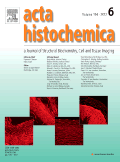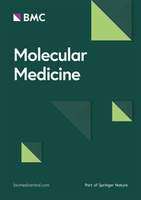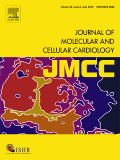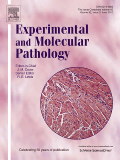
INTERNATIONAL JOURNAL OF EXPERIMENTAL PATHOLOGY
Scope & Guideline
Innovating Insights in Cell and Molecular Biology
Introduction
Aims and Scopes
- Pathological Mechanisms in Disease:
Research aimed at uncovering the fundamental mechanisms underlying various diseases, particularly focusing on how the extracellular matrix (ECM) contributes to disease pathology. - Innovative Experimental Techniques:
Utilization of advanced experimental methodologies, including in vivo models, gene therapy, and proteomics, to investigate disease mechanisms and potential therapeutic targets. - Matrix Biology and Tissue Engineering:
Studies emphasizing the role of the extracellular matrix in tissue repair, regeneration, and the development of innovative scaffolds for regenerative medicine. - Molecular and Cellular Interactions:
Exploration of the molecular pathways and cellular interactions that drive pathology, including the involvement of microRNAs, signaling pathways, and immune responses. - Translational Research:
Research that bridges the gap between basic science and clinical applications, particularly in understanding the implications of findings for therapeutic interventions in human diseases.
Trending and Emerging
- Extracellular Matrix (ECM) Dynamics:
A growing focus on the role of ECM in various diseases, particularly how ECM remodeling affects cellular behavior and disease progression, highlighting its importance in both pathology and therapy. - MicroRNA and Gene Regulation:
Increased publications on the role of microRNAs in regulating gene expression and their implications in various diseases, indicating a trend towards understanding post-transcriptional regulation in pathology. - Immune Response and Inflammation:
Emerging research on the role of the immune system and inflammatory processes in disease pathology, reflecting a broader understanding of how immune mechanisms influence disease outcomes. - Regenerative Medicine and Tissue Engineering:
A surge in studies related to regenerative medicine, particularly focusing on using stem cells and bioengineered tissues to repair or replace damaged organs and tissues, showcasing a significant trend in translational research. - Novel Therapeutic Strategies:
An increasing interest in innovative therapeutic approaches, including gene therapy and targeted treatments, which are becoming central to research as the field looks for new solutions to complex diseases.
Declining or Waning
- Traditional Histopathology Techniques:
There is a noticeable reduction in studies relying solely on traditional histopathological methods, as the field increasingly embraces molecular and genetic approaches to understand diseases. - Animal Models of Disease:
Although animal models are still relevant, there is a trend towards using more sophisticated in vitro systems, including organoids and 3D cultures, which may indicate a waning interest in basic animal studies for certain pathologies. - Basic Biochemical Analysis:
Papers focusing on basic biochemical analyses without integrating broader biological contexts or advanced technologies are becoming less prevalent, as the field moves towards more integrative and systems biology approaches.
Similar Journals

STEM CELLS AND DEVELOPMENT
Unraveling the Mysteries of Development and RegenerationSTEM CELLS AND DEVELOPMENT, published by Mary Ann Liebert, Inc., is a leading peer-reviewed journal dedicated to the rapidly advancing fields of stem cell biology and developmental science. With an ISSN of 1547-3287 and an E-ISSN of 1557-8534, the journal encompasses a broad range of topics central to understanding stem cells' roles in development and regeneration processes. It holds a prestigious standing within its category quartiles, ranking Q3 in Cell Biology, Q2 in Developmental Biology, and Q2 in Hematology for 2023. With its convergence from 2004 to 2024, STEM CELLS AND DEVELOPMENT fosters an innovative platform for researchers, professionals, and students to disseminate groundbreaking research, share insights, and explore novel therapeutic approaches. Open access options enhance the journal's visibility and accessibility, promoting a collaborative exchange of information among the scientific community. Positioned at the forefront of stem cell research and its applications, this journal is vital for anyone seeking to stay informed about the latest advancements and trends within these critical areas of study.

ACTA HISTOCHEMICA
Transforming Histochemical Discoveries into Medical AdvancementsACTA HISTOCHEMICA, a prestigious journal published by Elsevier GmbH, is dedicated to advancing the field of histochemistry and its applications within cell biology and medicine. With an ISSN of 0065-1281 and an E-ISSN of 1618-0372, the journal provides a critical platform for the dissemination of high-quality research findings and reviews, integral for both emerging and established scholars. Since its inception in 1954 and continuing through to 2024, ACTA HISTOCHEMICA has maintained a strong commitment to publishing significant advancements in histology and cell biology, as evidenced by its categorization in Q3 for Cell Biology and Histology, as well as Q2 in miscellaneous medicine for the year 2023. The journal ranks favorably in Scopus, holding the 27th rank in Histology and a 200th rank in Cell Biology, highlighting its importance to the academic community. With its headquarters in Munich, Germany, ACTA HISTOCHEMICA continues to attract contributions from global researchers, fostering an international dialogue essential for the growth of knowledge in histochemistry and related disciplines.

MOLECULAR MEDICINE
Bridging Research and Practice in Molecular MedicineMOLECULAR MEDICINE, published by SPRINGER, is a leading scholarly journal dedicated to advancing the fields of genetics and molecular biology with a focus on clinical applications. Since its inception in 1994, it has evolved to become a pivotal platform for disseminating innovative research findings, achieving a remarkable Q1 ranking in multiple categories, including Genetics, Molecular Biology, and Molecular Medicine as of 2023. Featuring an Open Access model since 2000, the journal ensures that cutting-edge research is freely available to the global scientific community, facilitating collaboration and knowledge exchange. With a commitment to high-quality peer-reviewed content, MOLECULAR MEDICINE serves as an essential resource for researchers, healthcare professionals, and students seeking to stay at the forefront of molecular research and its implications for medical science. For those interested in contributing to or accessing vital research in this dynamic field, MOLECULAR MEDICINE stands out as a premier choice.

Genes & Diseases
Pioneering research for a healthier tomorrow.Genes & Diseases, published by KEAI PUBLISHING LTD, is a premier open-access journal dedicated to advancing the fields of genetics, biochemistry, and molecular biology. Established in 2014 and headquartered in Beijing, China, this journal has quickly risen to prominence, securing a place in the prestigious Q1 quartile in Biochemistry and Genetics (clinical), as well as Q2 in Cell Biology and Q1 in Molecular Biology as of 2023. With a commitment to disseminating cutting-edge research, Genes & Diseases serves as a critical platform for researchers, professionals, and students alike, ensuring that high-quality scientific work is openly accessible to the global community. The journal's exceptional impact is underscored by its selective Scopus rankings, which reflect its influence and relevance in key scientific domains, making it an essential resource for those exploring the intersections of genetics and disease pathology.

JOURNAL OF MOLECULAR AND CELLULAR CARDIOLOGY
Leading the charge in molecular and cellular cardiology research.JOURNAL OF MOLECULAR AND CELLULAR CARDIOLOGY, published by Elsevier Science Ltd, is a premier scholarly journal dedicated to advancing the field of cardiology and cardiovascular medicine as well as molecular biology. With an impressive Q1 ranking in both categories as of 2023, the journal boasts a significant influence in the scientific community, evidenced by its Scopus rankings—33rd out of 387 in Cardiology and 65th out of 410 in Molecular Biology. Established in 1970 and continuing to publish groundbreaking research through 2024, the journal’s mission is to disseminate innovative findings that enhance our understanding of cardiovascular health at the molecular and cellular levels. Although it is not an open-access publication, it attracts top-tier research contributions, making it essential reading for researchers, healthcare professionals, and students aiming to stay ahead in the dynamic domains of cardiovascular and molecular biology research.

JOURNAL OF MUSCLE RESEARCH AND CELL MOTILITY
Exploring the Interplay Between Cells and Muscle MechanicsJOURNAL OF MUSCLE RESEARCH AND CELL MOTILITY, published by Springer, is a premier journal dedicated to advancing our understanding of muscle biology and cellular motility. With an ISSN of 0142-4319 and an E-ISSN of 1573-2657, this journal stands out in the fields of biochemistry, cell biology, and physiology, proudly holding a Q2 ranking in each of these categories as per 2023 metrics. Covering significant developments from its inception in 1963 to its anticipated contributions through 2024, this journal serves as a vital platform for researchers and professionals to disseminate their findings and insights globally. Although it does not currently offer open access, its robust academic rigor and relevance are evident from its Scopus rankings, making it a crucial resource for those invested in the biological sciences. With a focus on original research articles, reviews, and methodological advancements, the journal fosters innovative collaborations and discussions within the scientific community, making it an invaluable addition to any researcher’s library.

Skeletal Muscle
Exploring the intricate mechanisms of skeletal muscle physiology.Skeletal Muscle is a prestigious open access journal published by BMC, dedicated to advancing the field of muscle biology and its associated disciplines. With an ISSN of 2044-5040, this journal has consistently been a beacon of knowledge and innovation since its inception in 2011. Based in the United Kingdom, Skeletal Muscle has established an impressive reputation as reflected in its category quartile rankings for 2023, achieving Q1 status in Cell Biology, Molecular Biology, and Orthopedics and Sports Medicine. This esteemed journal holds notable Scopus rankings, including a remarkable 12th place out of 321 in Orthopedics and Sports Medicine, positioning it in the 96th percentile. The journal is committed to disseminating high-quality, peer-reviewed research that fosters collaboration among scholars, healthcare professionals, and students alike. With a mission to explore the intricate biological mechanisms underlying skeletal muscle physiology and its impact on health and disease, Skeletal Muscle plays a vital role in shaping the future of research in this critical area, ensuring that cutting-edge findings are accessible to all.

EXPERIMENTAL AND MOLECULAR PATHOLOGY
Advancing the frontiers of disease understanding.EXPERIMENTAL AND MOLECULAR PATHOLOGY, a distinguished journal published by Academic Press Inc Elsevier Science, is recognized for its significant contributions to the fields of pathology, clinical biochemistry, and molecular biology. With an ISSN of 0014-4800 and an E-ISSN of 1096-0945, this journal provides a platform for the dissemination of high-quality research articles, reviews, and experimental studies that deepen our understanding of disease mechanisms and diagnostic pathways. Since its inception in 1962 and through its converged publication years, the journal has consistently maintained a solid impact in the academic community, achieving high Scopus rankings—ranked #15 in the field of Pathology and Forensic Medicine and #22 in Clinical Biochemistry, showcasing a commendable percentile standing of 93rd and 81st respectively in 2023. The journal is accessible through various academic libraries and institutional subscriptions, making it an essential resource for researchers, professionals, and students committed to advancing knowledge in these critical areas. With a categorization that includes Q1 rankings in Pathology and Forensic Medicine, EXPERIMENTAL AND MOLECULAR PATHOLOGY stands as a prominent venue for pioneering scientific inquiry and collaborative advancement in molecular diagnostics and therapeutic strategies.

DNA AND CELL BIOLOGY
Illuminating the Path of Cellular AdvancementsDNA AND CELL BIOLOGY, published by Mary Ann Liebert, Inc, is a distinguished journal in the realms of cell biology, genetics, and molecular biology, holding a notable position in its Q3 and Q2 quartile rankings across multiple academic categories as of 2023. With an ISSN of 1044-5498 and an E-ISSN of 1557-7430, this journal has been a pivotal platform for the dissemination of cutting-edge research since its inception in 1990, extending its coverage through 2024. Situated in the United States, the journal offers high-quality peer-reviewed articles, exploring significant advancements in biological sciences while fostering interdisciplinary collaborations within the research community. Though it currently does not offer open access, subscribed institutions and individual readers benefit from its rich repository of knowledge. The journal's rigorous standards and impactful content make it an essential resource for researchers, professionals, and students alike, aiming to stay at the forefront of discoveries influencing DNA and cellular dynamics.

SEMINARS IN CELL & DEVELOPMENTAL BIOLOGY
Fostering Collaboration in Life Sciences DiscoverySEMINARS IN CELL & DEVELOPMENTAL BIOLOGY is a premier journal published by Academic Press Ltd - Elsevier Science Ltd, focusing on the vital domains of cell and developmental biology. With an impact factor that reflects its rigorous contributions to the field, this journal embodies the highest standards of academic excellence, currently ranking in the Q1 quartile for both Cell Biology and Developmental Biology categories as of 2023. Researchers and practitioners will appreciate its robust Scopus ranking, placing it within the top tiers of developmental biology and cell biology, with percentile ranks of 94th and 90th respectively, showcasing the journal's influential presence in the scientific community. The journal aims to disseminate comprehensive reviews, cutting-edge research articles, and significant advances in the understanding of cellular mechanisms and developmental processes, thereby catering to a diverse audience that includes researchers, scholars, and students dedicated to the life sciences. Given its commitment to open access, SEMINARS IN CELL & DEVELOPMENTAL BIOLOGY promotes widespread dissemination of knowledge, enhancing collaborative research efforts and driving innovation across biological disciplines.